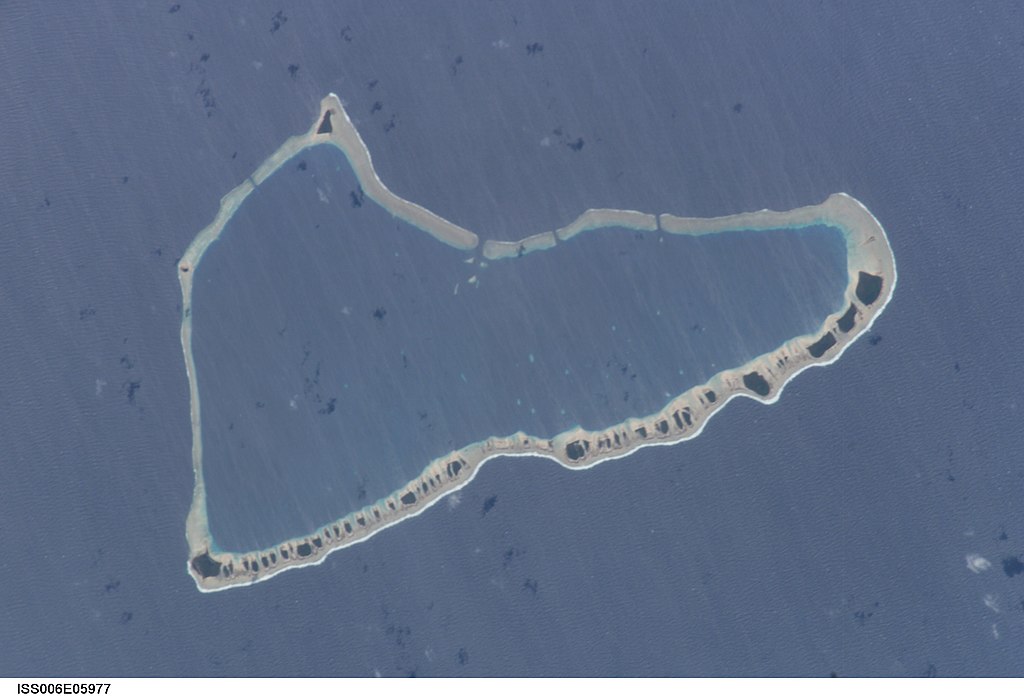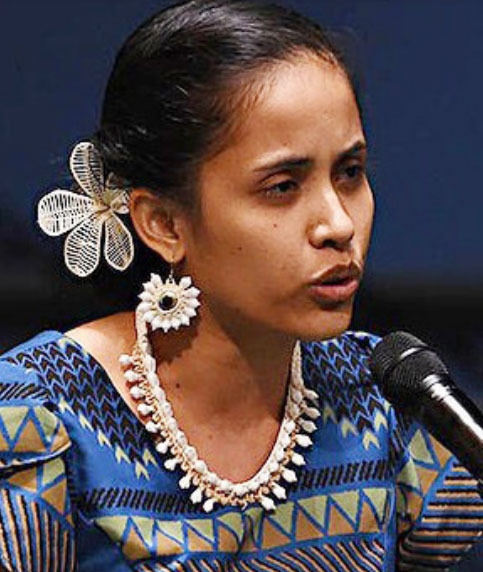5.8.1.3 Poetry on Climate Change: Central Idea
Marshall Islands Beach, Image Source: Peter Mellow via Pixabay (Royalty-Free Image) [
link]
Grade: 3-7 Subject:
English Language Arts Number
of Activities: 2
Poetry is a powerful way to share stories and messages. In this lesson, students will study and analyze central idea through two poems by Kathy Jetnil-Kijiner, a Marshallese woman who uses her poetry to bring attention to Marshallese culture and the impact of climate change. Students will recognize the value of poetry as a vehicle to share untold stories about events small and large.
Students will:
- Identify a poem’s central idea and cite text evidence to support central ideas.
- Identify and analyze similes and metaphors as effective devices in discussing everyday details.
- Craft a poem about climate change in the style of a poems from the lesson.
- Recognize poetry as a means to share stories and experiences.
Story from Untold Civil Rights Stories
Materials provided:
Kathy Jetinl-Kijiner, Image Source: Untold Stories Through Poetry.
Activity 1: Introducing Kathy Jetnil-Kijiner (Suggested Time: 15 minutes)
This activity provides students with background information on Kathy Jetnil-Kijiner and the Marshall Islands to prepare students for reading and studying the two poems covered in the lesson.
-
Today we will learn about poet Kathy Jetnil-Kijiner, whose poetry we’ll be reading later.
- Kathy was born in the Marshall Islands and moved to Hawai’i at the age of 7. At the age of 25, she moved back to the Marshall Islands.
- She is a climate activist who addressed the United Nations’ Climate Summit in 2014.
- She writes about the nuclear testing that was conducted in the Marshall Islands, militarism, the rising sea level caused by climate change, forced migration, racism in the U.S., and more.
- From 1946 to 1958, the U.S. conducted 67 nuclear tests in the Marshall Islands.
- These tests are equivalent to 1.6 Hiroshima-size explosions per day: In 1945, during WWII, the U.S. dropped two nuclear bombs on the Japanese cities of Hiroshima and Nagasaki.
- Ask students to define the following terms: “climate activist”, “militarism”, “forced migration”, and “Hiroshima-sized explosion”. Have a few students define each term aloud, and fill in gaps in their definitions as needed. Below are definitions to use as guides, adapted from Encyclopedia Britannica:
- Climate Activist: a person works to spread awareness about climate change and to protect the environment from being damaged by human activities
- Militarism: the belief and attitude that having strong armed forces and that they should be used to win political or economic advantages
- Forced Migration: when an individual or group permanently leaves their home to live elsewhere because of factors that are out of their control, like war, natural or environmental disasters, development projects, and more.
- Hiroshima-sized explosions: about 70,000 killed in the initial explosion and tens of thousands more would die of radiation poisoning within the next year; about 135,000 casualties which totaled to more than half of its population; more than 60,000 of the estimated 90,000 buildings in Hiroshima were destroyed or severely damaged
- In groups of 2-3, give students a few minutes to discuss how climate change relates to the Marshall Islands. Ask a few groups to share their answers. Then, show this Google map of the Marshall Islands and share that the islands are very vulnerable to climate change, especially rising sea levels.
- Zoom in and out to show the islands’ location and size in comparison to other land masses.

An aerial view Ailuk Atolls of the Marshall Islands, Image Source: NASA (public domain image) [
link]
Activity 2: “2 Degrees” (Suggested Time: 30+ minutes)
Students read the poem “2 Degrees” and begin to identify the central idea and analyze the message of the poem through studying both the central idea and the stanzas of the poem.
- Explain the concept of central idea to the students:
The central idea of a passage is the message that the author is trying to get across to the reader. A central idea is stated in a sentence, not just one to two words.
- Have students popcorn read “2 Degrees”, stopping after each stanza to give students a chance to ask about unfamiliar words or phrases. [AAPI Women Voices: Untold Stories Through Poetry, p.6]
- Distribute the “2 Degrees” Worksheet to the students. Then, go over the first row with the class.
- Pick a student to read the lines in the left column and ask them what they think the lines mean.
- If necessary, guide them to the key words/phrases of 2 degrees (also the poem’s title), warm the world, catastrophe, etc. to help them arrive to an interpretation that mentions climate change and 2 degrees being the maximum/tipping point.
| Lines from the Poem |
Your Meaning |
Scientists say
if humans warm the
world more than 2
degrees then catastrophe
will hit |
Example Meaning: Scientists & experts warn that if the Earth warms more than 2 degrees Celsius, many different natural disasters, such as storms, fires, rising sea levels, will happen and harm the world. |
- Have students complete the rest of the worksheet in class. You may choose to have students work in small groups or work individually. Go around the classroom and check in with students to help them if / as needed.
- End the activity by asking two students to share their response to each question. You may choose to skip going over each row of the table if there isn’t enough time to review the table.
- Assign the “Tell Them” Worksheet for homework.
Optional Extension Activity:
In place of assigning homework to students, you can teach the lesson for an additional day and have students work on the
“Tell Them” Worksheet in class. You may choose to have students work in groups or individually, review answers to the worksheet as a class, and/or have students present their poems to the class or to a shoulder partner.
California Common Core Standards Addressed
College- and Career-Readiness Anchor Standards (CCSS):
L: Language, R: Reading, SL: Speaking & Listening, W: Writing
CCSS.ELA-LITERACY.L9-10.5:
Demonstrate understanding of figurative language, word relationships, and nuances in word meanings.
CCSS.ELA-LITERACY.CCRA.L.5:
Demonstrate understanding of figurative language, word relationships, and nuances in word meanings.
CCSS.ELA-LITERACY.CCRA.L.6:
Acquire and use accurately a range of general academic and domain-specific words and phrases sufficient for reading, writing, speaking, and listening at the college and career readiness level; demonstrate independence in gathering vocabulary knowledge when encountering an unknown term important to comprehension or expression.
CCSS.ELA-LITERACY.CCRA.R.2:
Determine central ideas or themes of a text and analyze their development; summarize the key supporting details and ideas.
CCSS.ELA-LITERACY.CCRA.R.4:
Interpret words and phrases as they are used in a text, including determining technical, connotative, and figurative meanings, and analyze how specific word choices shape meaning or tone.
CCSS.ELA-LITERACY.CCRA.R.5:
Analyze the structure of texts, including how specific sentences, paragraphs, and larger portions of the text (e.g., a section, chapter, scene, or stanza) relate to each other and the whole.
CCSS.ELA-LITERACY.CCRA.R.6:
Assess how point of view or purpose shapes the content and style of a text.
CCSS.ELA-LITERACY.CCRA.SL.1:
Prepare for and participate effectively in a range of conversations and collaborations with diverse partners, building on others' ideas and expressing their own clearly and persuasively.
CCSS.ELA-LITERACY.CCRA.SL.4:
Present information, findings, and supporting evidence such that listeners can follow the line of reasoning and the organization, development, and style are appropriate to task, purpose, and audience.
CCSS.ELA-LITERACY.CCRA.W.4:
Produce clear and coherent writing in which the development, organization, and style are appropriate to task, purpose, and audience.




